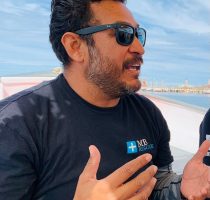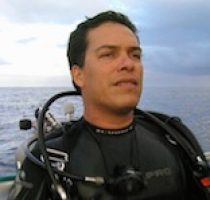
About us
meet our team

Mexican biologist that received her degree from the National University of Mexico (UNAM). She has been able to combine her passion for whales and research with her job as naturalist guide and operations manager in Ecotours de Mexico. She is the head researcher of ECOBAC. She has participated in marine mammal surveys in the North Atlantic and the Mexican Pacific. Representative of Banderas Bay in 2003 and Representative of the Whale watching Committee at the Mexican Society for the Study of Marine Mammals (SOMEMMA). Representative of whale watching tour operators at the Whale Watching Standing Group of the International Whaling Commission (2012-2014). Coordinates the Mexican Whale Disentanglement Network since 2012.

Karel is a pioneer of ecotourism in Mexico, he is a cofounder and former president of the Mexican Association of Ecotourism and Adventure Travel (AMTAVE). He is also founder and managing director of Ecotours de Mexico, a nature tour operator. His lifelong love of nature and his interest in ecotourism has lead him to travel and lead trips all over Mexico. In 2006 he got his masters degree in sustainable development and tourism, his research topic was “Whale Watching in Banderas Bay as a Sustainable Tourist Activity”. Trained as Whale disentanglement Instructor has participated in several trainings in Mexico and Latin America.

Expert in marine mammal handling and care. In the last 10 years, he has specialized in the rescue and attention of Cetaceans and Pinipeds. We directs the Rescue Center from the Whale Museum in La Paz, B.C.S. he has been an active member of the Mexican Whale Disentanglement Network, known as RABEN, since its beginning in 2004. in 2015 he got his certification as a large whale entanglement response instructor by the International Whaling Commission. He participated as a consultant in vaquita porpoise recovery and in ghost gear removal programs in the Upper Golf of Mexico.

Veterinarian specialized in zootechnics. She graduated from the University of Guadalajara, with over 17 years of experience in the care and management of marine mammals. Her passion for marine life has led her to participate in conservation, rehabilitation, and welfare initiatives for various species. Additionally, she works in the clinical area with small species, showing a strong interest in ethology and animal behavior, areas that complement her comprehensive approach to animal health and welfare.

Pedro has a Marine Biology PhD by the University of North Carolina and he is currently professor at the University of Guadalajara, Campus Puerto Vallarta. Most of his research projects involve marine biology studies in the Mexican Pacific, most particularly Banderas Bay, and the Jalisco and Nayarit coast. His coral reef research studies involve the biology and ecology of marine organisms with the purpose of improving coral reef protection through conservation activities and programs in National Parks.

Frank established in Puerto Vallarta in 2004 and impressed with the richness of the local fauna he began creating photographic archives. Since then he has been collaborating with different organizations such as Reptilario Cipactli Cento Universitario de la Costa U de G, Municipality of Puerto Vallarta Division of Environment and Ecology, Estero El Salado Trust, Conservation and Sustainable Use of Crocodiles in Mexico (COMACROM), Puerto Vallarta Tourism Trust, Western Ecological Society, Group of Ecology and Conservation of Islands A.C., and Naturalia A.C. magazine “Species”, among others. Since 2006 he collaborates with ECOBAC in research and environmental education projects
RESEARCH

Photo-identification catalog of humpback whales in Banderas Bay, Jalisco-Nayarit, Mexico. (FIBB Catalog)
FIBB catalog identification with collaborators (11)
Collaboration with the SPLASH Project (Structure of Populations, Levels of Abundance and Status of Humpback Whales in the North Pacific) to understand the structure and abundance of humpback whale populations in the North Pacific.
10 years of the FIBB catalogue: 991 individuals and 2290 records.
We collaborated in the development of the CONANP Species Conservation Action Plan: PACE Humpback Whale.
We work with the Autonomous University of Baja California Sur (UABCS) on the Regional Humpback Whale Protection Program in Los Cabos, Baja California Sur, and in Bahía de Banderas, Rincón de Guayabitos, and San Blas (Jalisco and Nayarit). This program was sponsored by CONANP (National Conservation Association of National Parks).

Project "Photo Identification Catalog and Monitoring of Humpback Whales in Isabel Island National Park"
16 years of the FIBB Catalog: 1,731 individuals and 5,189 records.

4th International Congress on Marine Mammals and Natural Protected Areas (ICMMPA)

"Banderas Bay Whale Monitoring Program"
25 years of the FIBB Catalog: 2,272 individuals and more than 7,000 records.
20 students: 13 social service projects, 6 professional internships and 8 Bachelor's theses from the Universities UNAM, UCOL, UdG (CUC and CUCBA), UMAR, ITBB, UAM, UAS, ITVG.
Publication of scientific articles in journals such as: Latin American Journal of Aquatic Mammals, Conservation Biology, Ocean and Coastal Management, among others.
We collaborate with various academic institutions such as the National Autonomous University of Mexico (UNAM), the Autonomous University of Baja California Sur (UABCS), the Faculty of Marine Sciences of the University of Colima (UAC), the University of the Sea in Oaxaca (UMAR), among others.
FIBB Catalog: 3,800 different whales and more than 13,000 records.
ENVIRONMENTAL EDUCATION

1st Symposium on Humpback Whales in Banderas Bay.
2nd Symposium on Humpback Whales in Banderas Bay.
3rd Symposium on Humpback Whales in Banderas Bay.
4th Symposium on Humpback Whales in Banderas Bay.
Participation with a lecture in the training course for authorized whale watching tour operators, DGVS (taught annually since 2010)
Training workshop for whale-watching tour operators in Banderas Bay.
Training workshop for whale-watching tour operators in San Blas, Nay.
We launched the "I Do Take Care of the Whales" campaign to promote good navigation practices.

I care for whales campaign

First BALLENARTE Conservation Festival.
Training workshop for whale-watching tour operators in Rincón de Guayabitos, Nay.
Second BALLENARTE Festival.
Training workshop for whale-watching tour operators in Mazunte, Oaxaca.

Third BALLENARTE Festival in collaboration with CONANP.
Training workshop for whale-watching tour operators in Zihuatanejo, Gro.

Inflatable whale 43ft long, named La Bonita
Outreach work by regularly publishing in various journals: Especies de Naturalia, AC, Mexicoa, the UdG Scientific Research Outreach Journal, Biodiversitas de CONABIO, Espacio Profundo, among others.
Talks will be held at the marinas in Nuevo Vallarta and Riviera Nayarit to inform boaters about the importance of protecting whales, Mexican whale-watching regulations, and what to do if they encounter an entangled whale.
CONSERVATION PROJECTS
First Entangled Humpback Whale Rescue.
RABEN (Entangled Whale Care Network) is established.

First training for rescues RABEN ECOBAC / NOAA International Instructor.
Creation of the National Entangled Whale Rescue Network (RABEN). We grew from one team to 15, training 180 RABEN members through 12 workshops (in collaboration with CONANP).
RABEN/ECOBAC joins the International Whaling Commission's Global Whale Entanglement Response Network (GWREN).
Support to the International Whaling Commission by providing courses on dealing with entanglements of large whales in Chile (2015), Peru (2016) and Colombia (2017).

First National RABEN Meeting.
Training for RABEN teams.

RABEN San Felipe, Alto Golfo.
A new team is added to the national network.

More than 100 whales successfully released.
ECOTOURISM AND SUSTAINABLE DEVELOPMENT
Collaboration with the publication "Status of Cetacean Sightings in Latin America" published by Hoyt and Iñiguez.
"Humpback Whale Information, Prevention, Surveillance, and Monitoring in Banderas Bay" program to disseminate NOM-131 and good navigation practices during whale season.
Collaboration with the International Whaling Commission in the integration of the Whale Watching Manual.
Participation in training workshops for whale-watching tour operators in Jalisco and Nayarit.

Vessel Strike Prevention
Campaign “Less Speed = More Lives” in Banderas Bay and Los Cabos.